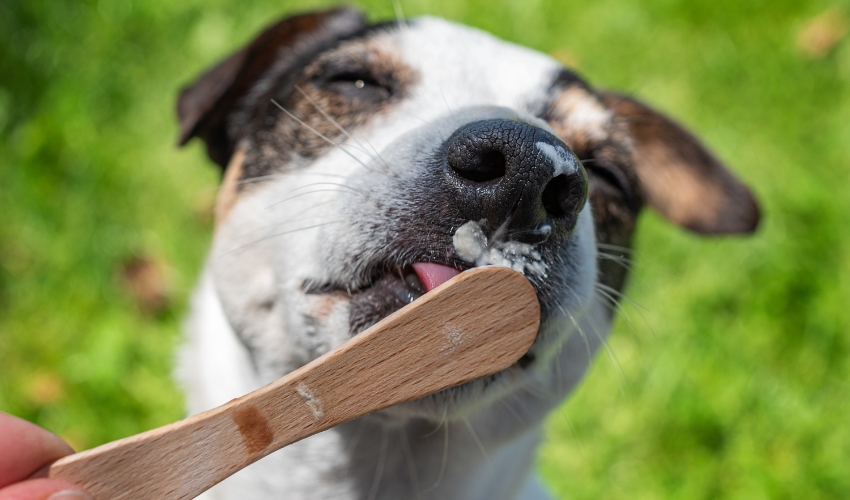When it comes to our fur baby’s health, we have to remember that oral health is just as important as any other aspect of their overall well-being. Just like humans, our pooch requires a certain degree of care to keep their teeth in good shape. In maintaining good oral health in our fur babies, we should know that proper nutrition plays a role.
Daily brushing of the teeth and dental cleanings are the best ways to prevent the development of periodontal disease in our fur babies. Still, it is also essential to know that diet can play a role in protecting our dearest fur baby’s oral health. One misconception that is often heard is that any dry food will help maintain a dog’s dental health, but research showed that this is not the case. According to an article in PetMD, Studies from the early 1900s showed that dogs who ate dry food had better oral health than those who ate canned food. On the other hand, a large study that was done in 1996 looked at 1350 client-owned dogs in North America and found few apparent differences between dogs that ate “dry food only” versus dogs who were fed “other than dry food”. There was noted less accumulation of calculus, less gingival inflammation, and less periodontal bone loss in dogs that were given access to more types of chewing materials such as rawhides, bones, and biscuits compared with dogs given access to fewer or no chewing materials.
What Foods Help Improve Your Fur Baby’s Dental Health?
Aside from regular oral hygiene and dental cleanings, there are also certain foods that can help our dear furry friend’s dental health:

- Raw Animal Bones
Chewing on raw bones provides a natural way for your fur baby to clean their teeth. The gnawing action helps remove plaque and tartar, preventing the buildup of dental issues such as gingivitis. Chewing on bones can also stimulate the gums, promoting an increase in blood flow to the gums which maintains overall gum health. Never give your dogs cooked bones since they can splinter and break, seriously injuring them. Instead, make sure the size of the bone is appropriate for their stature.
- Raw Fruits and Vegetables
Certain raw fruits and vegetables can help maintain dental health by promoting chewing and providing natural abrasion. Apples, carrots, and celery are examples of crunchy options that may help clean teeth.
- Yogurt or Kefir
Yogurt and kefir include probiotics, which are essential for the immune system and digestive health of your dog. You can either add yogurt to their diet or give them the probiotics orally. These probiotics will rid of the harmful bacteria in your fur baby’s mouth which helps in preventing inflammation and periodontitis from developing.
- Hard Dog Food
Dry kibble requires more chewing than wet food, and the abrasive action can help reduce plaque buildup. Opt for high-quality, balanced dry dog foods that meet your dog’s nutritional needs.
- Dental Chews and Treats
There are specially formulated dental chews and treats designed to promote oral health. Chewing stimulates saliva production and saliva contains enzymes that can aid in breaking down and removing bacteria in the mouth which contributes to a healthier oral environment. Aside from dental health benefits, these products also have a positive impact on your pooch’s mental well-being as it may help reduce stress and anxiety. Look for products approved by veterinary associations and designed to reduce plaque and tartar.
It’s important to note that individual dogs may have different dietary needs, and factors such as age, breed, and overall health should be considered. Additionally, consulting with your veterinarian is essential to ensure that your dog’s diet is appropriate for their specific requirements.
How Nutrition Impacts The Dental Health of Dogs
Nutrition plays a crucial role in the dental health of dogs. A well-balanced and appropriate diet can contribute to strong teeth, healthy gums, and an overall lower risk of dental issues. Here are several ways in which nutrition impacts the dental health of your dog:

- Nutrient Intake
Proper nutrition provides the essential vitamins and minerals necessary for maintaining overall health, including dental health. Key nutrients like calcium, phosphorus, and vitamin D are essential for the development and maintenance of strong teeth and bones.
- Avoidance of Sugars and Carbohydrates
Diets high in sugars and carbohydrates can contribute to the growth of bacteria in the mouth, leading to plaque formation and an increased risk of dental issues. Choosing a diet with balanced carbohydrates and avoiding excessive sugars is important for your dog’s oral health.
- Proper Protein Levels
Protein is essential for overall health, including the health of the oral tissues. Adequate protein intake supports the development and maintenance of healthy gums and tissues in the mouth.
- Avoidance of Fillers and Additives
High-quality dog foods with minimal fillers and additives are generally better for dental health. Fillers can contribute to the formation of plaque, while additives may not provide the necessary nutrients for overall health.
- Balanced pH Levels
The pH balance of your fur baby’s saliva is influenced by diet. Diets that help maintain an appropriate pH level such as kelp, parsley, and alfalfa can create an environment less conducive to the growth of bacteria, reducing the risk of dental problems.
It’s important to note that while nutrition is a key factor, it should be part of a holistic approach to dental care. Regular dental check-ups, proper oral hygiene practices, and, in some cases, dental treats or toys can complement a nutritious diet in maintaining optimal dental health for your dog. Always consult with your veterinarian to determine the most suitable diet and dental care plan for your dog.












